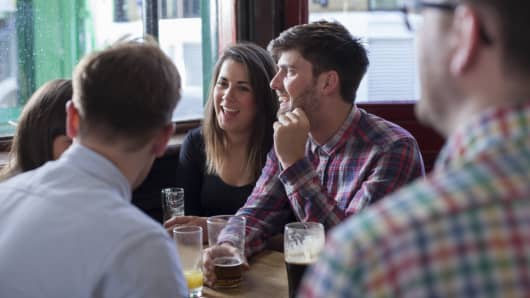
As the Ebola pandemic reaches America's largest city, investors are wondering if there will be any economic impact from the scare.
If trends in Dallas are any indication, there looks like there could be. A new report from GuestMetrics, a firm that tracks transactions across consumer and hospitality industries, reveals the Ebola cases in the city had a direct impact on consumer behavior and hurt local businesses.
The entire nation watched with trepidation as Thomas Eric Duncan became the first person to test positive for Ebola in the U.S., and then within two weeks, the virus spread to two nurses who cared for him at Texas Health Presbyterian Hospital. Duncan was admitted to the hospital on Sept. 28 and died Oct. 8.
Local residents responded by staying home.
Roy Mehta | Taxi | Getty Images
GuestMetrics data show a significant drop in restaurant, bar and hotel traffic. During the first week of October in Dallas, the number of diners at restaurants was 2 percent lower than the same period a year earlier. It fell further in the following week, down 5 percent from the prior year, according to GuestMetrics.
Bars and clubs, along with fine dining restaurants, and lodging were the hardest-hit categories.
Read More › America's favorite restaurant—Olive Garden?
The number of customers at bars and clubs fell 11 percent from the year-earlier period.
Lodging traffic dropped 7 percent, "likely a sign of business travelers canceling or postponing their trip to Dallas," according to the GuestMetrics' press release.
Casual and fast food restaurant traffic fared better, though still showed a slight drop.
Among customers who did dine out in Dallas during the Ebola scare, GuestMetrics found that they consumed fewer alcoholic drinks.
September was already a weak month for alcoholic beverage sales in Dallas. However, they slid sharply in early October.
Read More › New test can spot Ebola in 30 minutes
Beer sales volume was down 10 percent in the first two weeks of October from the prior year, while spirits volumes were down 8 percent.
Overall, the slump in business was temporary, as traffic rebounded in the third week of October when "it had become clear that a broader outbreak in the area was not imminent," according to the release.
However, the hit to lodging persisted.
While the negative impact in Dallas proved largely short-lived, the findings are revealing, especially as cases of Ebola emerge in bigger, more densely-populated places like Manhattan. LINK


